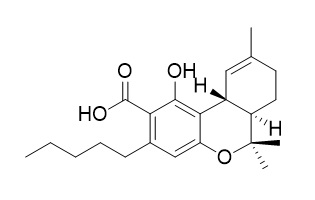Delta-9-Tetrahydrocannabinolic acid
Delta-9-Tetrahydrocannabinolic acid can protect dopaminergic neurons against MPP(+) induced cell death.
Inquire / Order:
manager@chemfaces.com
Technical Inquiries:
service@chemfaces.com
Tel:
+86-27-84237783
Fax:
+86-27-84254680
Address:
1 Building, No. 83, CheCheng Rd., Wuhan Economic and Technological Development Zone, Wuhan, Hubei 430056, PRC
Providing storage is as stated on the product vial and the vial is kept tightly sealed, the product can be stored for up to
24 months(2-8C).
Wherever possible, you should prepare and use solutions on the same day. However, if you need to make up stock solutions in advance, we recommend that you store the solution as aliquots in tightly sealed vials at -20C. Generally, these will be useable for up to two weeks. Before use, and prior to opening the vial we recommend that you allow your product to equilibrate to room temperature for at least 1 hour.
Need more advice on solubility, usage and handling? Please email to: service@chemfaces.com
The packaging of the product may have turned upside down during transportation, resulting in the natural compounds adhering to the neck or cap of the vial. take the vial out of its packaging and gently shake to let the compounds fall to the bottom of the vial. for liquid products, centrifuge at 200-500 RPM to gather the liquid at the bottom of the vial. try to avoid loss or contamination during handling.
Carbohydrate Polymer Technologies & App.2021, 2:100049.
Drug Des Devel Ther.2020, 14:5189-5204.
Oncology Letters2018, 4690-4696
Srinakharinwirot University2023, 2669.
Rep.Grant.Res.,Asahi Glass Foun.2023, No.119.
Biochem Biophys Res Commun.2017, 494(3-4):587-593
J Agric Food Chem.2015, 63(44):9869-78
Korean J Pain.2021, 34(4):405-416.
Biomed Pharmacother.2020, 128:110318.
Nutrients.2023, 15(6):1335.
Related and Featured Products
Phytomedicine. 2012 Jun 15;19(8-9):819-24.
Effects of cannabinoids Δ(9)-tetrahydrocannabinol, Δ(9)-tetrahydrocannabinolic acid and cannabidiol in MPP+ affected murine mesencephalic cultures.[Pubmed:
22571976 ]
Cannabinoids derived from Cannabis sativa demonstrate neuroprotective properties in various cellular and animal models. Mitochondrial impairment and consecutive oxidative stress appear to be major molecular mechanisms of neurodegeneration.
METHODS AND RESULTS:
Therefore we studied some major cannabinoids, i.e. Delta-9-Tetrahydrocannabinolic acid (THCA), delta-9-tetrahydrocannabinol (THC) and cannabidiol (CBD) in mice mesencephalic cultures for their protective capacities against 1-methyl-4-phenyl pyridinium (MPP(+)) toxicity.
MPP(+) is an established model compound in the research of parkinsonism that acts as a complex I inhibitor of the mitochondrial respiratory chain, resulting in excessive radical formation and cell degeneration. MPP(+) (10 μM) was administered for 48 h at the 9th DIV with or without concomitant cannabinoid treatment at concentrations ranging from 0.01 to 10 μM. All cannabinoids exhibited in vitro antioxidative action ranging from 669 ± 11.1 (THC), 16 ± 3.2 (THCA) to 356 ± 29.5 (CBD) μg Trolox (a vitamin E derivative)/mg substance in the 1,1-diphenyl-2-picrylhydrazyl radical (DPPH) assay. Cannabinoids were without effect on the morphology of dopaminergic cells stained by tyrosine hydroxylase (TH) immunoreaction. THC caused a dose-dependent increase of cell count up to 17.3% at 10 μM, whereas CBD only had an effect at highest concentrations (decrease of cell count by 10.1-20% at concentrations of 0.01-10 μM). It influenced the viability of the TH immunoreactive neurons significantly, whereas THCA exerts no influence on dopaminergic cell count. Exposure of cultures to 10 μM of MPP(+) for 48 h significantly decreased the number of TH immunoreactive neurons by 44.7%, and shrunken cell bodies and reduced neurite lengths could be observed. Concomitant treatment of cultures with cannabinoids rescued dopaminergic cells. Compared to MPP(+) treated cultures, THC counteracted toxic effects in a dose-dependent manner. THCA and CBD treatment at a concentration of 10 μM lead to significantly increased cell counts to 123% and 117%, respectively.
CONCLUSIONS:
Even though no significant preservation or recovery of neurite outgrowth to control values could be observed, our data show that cannabinoids THC and THCA protect dopaminergic neurons against MPP(+) induced cell death.



